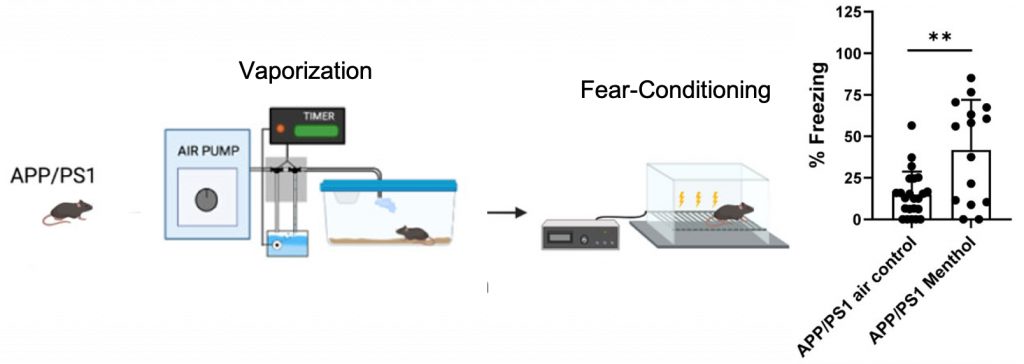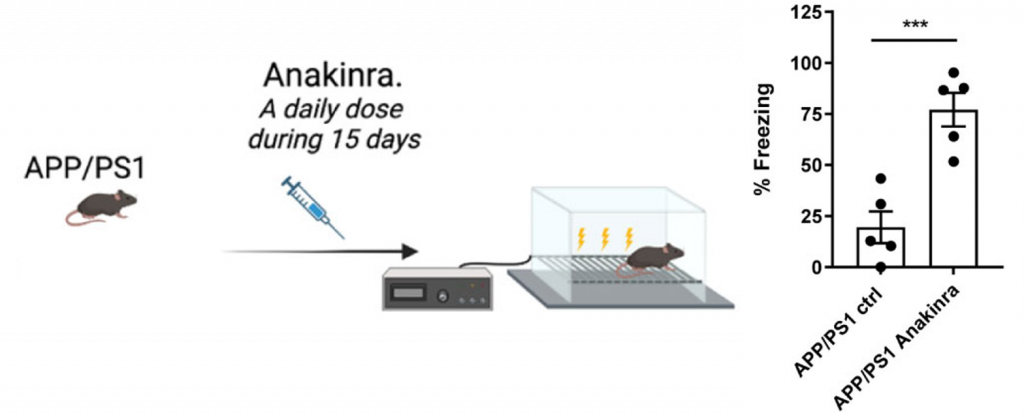Key Points:
- Menthol — which gives mint its aroma and flavor — improves the memory of a mouse model for Alzheimer’s disease (AD).
- Inhalation of menthol reduces inflammation-promoting molecules in AD mouse brains.
- An immunosuppressant drug — anakinra — also improves memory in AD mice.
Our perception of smell influences not only our memory and emotions but also our immune system. At least, this is what scientists are beginning to understand.
Researchers from the University of Navarra in Spain report in Frontiers in Immunology that menthol inhalation reduces brain inflammation and improves memory in a mouse model for AD. Casares and colleagues also show that an arthritis drug that targets inflammation has a similar effect on memory.
“This study is an important step toward understanding the connection between the immune system, the central nervous system and smell, as the results suggest that odors and immune modulators may play an important role in the prevention and treatment of Alzheimer’s.” and other diseases related to the central nervous system,” says lead author, Dr. Noelia Casares.
Menthol and Anakinra Improve Memory
To determine the effects of menthol inhalation on AD, Casares and colleagues placed AD model mice into a cage connected to a vaporizer, allowing for vaporized menthol to fill the cage.
Memory was assessed by placing the mice onto an electric grid to evoke a painful shock. The next day, the mice were placed onto the grid again, this time without the electric shock. If the mice froze, it was a sign of them remembering (and fearing) the painful shock from the previous day.
It was found that menthol-treated AD mice froze more than untreated AD mice, suggesting improved memory. Notably, a similar effect was observed in normal young (6- to 8-week-old) mice.

Casares and colleagues went on to find that menthol-treated AD mice have reduced brain inflammation. This was shown by reduced gene activation of a pro-inflammatory molecule called IL-1β. IL-1β and inflammation are known to underlie many chronic diseases and contribute to the cognitive deficits and neurodegeneration associated with brain inflammation.

To explore brain inflammation further, Casares and colleagues tested an existing drug called anakinra. Anakinra suppresses inflammation and is often prescribed to help treat conditions like arthritis. AD mice injected with 50 mg/kg/day anakinra were found to freeze more often during the fear-conditioning test, suggesting improved memory.

Overall, the findings of Casares and colleagues suggests that menthol modulates the immune system to reduce brain inflammation and improve memory. Additionally, similar results can be achieved with the anti-inflammatory drug anakinra. Based on these results, it would seem that reducing inflammation has beneficial effects on brain function.
Essential Oils and Alzheimer’s Disease
According to the Cleveland Clinic, essential oils are concentrated plant extracts that can be used in aromatherapy and have been shown to boost mood, reduce stress, improve sleep, and kill microbes. Essential oils contain small, fat-soluble molecules called terpenes and terpenoids that can be absorbed through the skin or nasal passage into the bloodstream to exert their biological effects.
Aromatherapy with essential oils has been shown to improve cognitive function, reduce restlessness, and enhance sleep quality in AD patients. For example, a Japanese study showed improvements in cognition after aromatherapy with rosemary and lemon grass essential oils in the morning then lavender and orange essential oils in the evening for dementia patients. These and other essential oils can be purchased online or in stores at a relatively low cost.